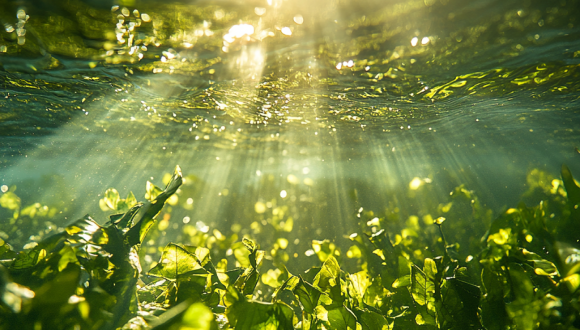פוטוסינתזה
פוטוסינתזה עיצבה את העולם כפי שאנו מכירים אותו כיום, והשפעתה ממשיכה להיות קריטית להתמודדות עם אתגרי המאה ה-21: אבטחת מזון, שינויי אקלים, ומעבר לאנרגיה מתחדשת. על אף יותר ממאה שנות מחקר בתחום, היכולת להבין, לשפר ולכוון את הפוטוסינתזה טרם מוצתה, ויש בה פוטנציאל עצום למהפכה תעשייתית וביולוגית. המחקר בפוטוסינתזה תורם לבניית עתיד שבו צמחים ואצות יהפכו לכלים מדויקים ומבוססי-טבע להפקת מזון, אנרגיה וחומרים בתנאים משתנים ובצורה בת-קיימא.
פוטוסינתזה היא התהליך הביולוגי שבאמצעותו צמחים, אצות וחיידקים פוטוסינתטיים ממירים אנרגיית אור לאנרגיה כימית - תהליך שבנה את האטמוספירה כפי שאנו מכירים אותה, ומניע את כלל שרשראות המזון על פני כדור הארץ. לתהליך זה השפעות עמוקות על האקלים, על זמינות משאבי האנרגיה, ועל יכולתנו להזין אוכלוסייה עולמית הולכת וגדלה.
בבית הספר למדעי הצמח ואבטחת מזון נחקרת הפוטוסינתזה ממגוון זוויות, תוך שילוב בין ביולוגיה מולקולרית, ביוכימיה, פיזיולוגיה של הצמח, והנדסה ביולוגית. החוקרים עוסקים בשיפור יעילות קצירת האור, המרת אנרגיה סולארית, וקיבוע הפחמן הדו-חמצני - מרמת האברון הפוטוסינתטי הבודד (הכלורופלסט) ועד לרמת הצמח השלם והמערכת האקולוגית. נחקרים מסלולים ביוכימיים חדשים לקיבוע פחמן שאינם קיימים בטבע, לצד מנגנוני ויסות פנימיים של פיזור אנרגיה בצמחים בתנאי עקה. כמו כן, נעשה שימוש בכלים של ביולוגיה סינתטית לשיפור יכולות הפוטוסינתזה, בין היתר על ידי תכנות מחדש של רכיבים מולקולריים בצמחים ואצות, ופיתוח מערכות מלאכותיות המבוססות על מנגנונים פוטוסינתטיים טבעיים.
Photosynthesis has shaped the world as we know it, and its impact remains vital in tackling the key challenges of the 21st century: food security, climate change, and the transition to renewable energy. Despite over a century of research, our ability to fully understand, enhance, and direct photosynthesis is still far from complete—yet it holds tremendous potential for both industrial and biological revolutions. Research in photosynthesis is paving the way toward a future where plants and algae become precise, nature-based tools for producing food, energy, and materials under changing conditions and in a sustainable manner.
Photosynthesis is the biological process by which plants, algae, and photosynthetic bacteria convert light energy into chemical energy. This process built the atmosphere as we know it and drives all food chains on Earth. Its effects are far-reaching, influencing climate regulation, energy resource availability, and our ability to feed a growing global population.
At the School of Plant Sciences and Food Security, photosynthesis is studied from a variety of angles, integrating molecular biology, biochemistry, plant physiology, and biological engineering. Researchers work on improving the efficiency of light harvesting, solar energy conversion, and carbon dioxide fixation—ranging from the level of the individual photosynthetic organelle (the chloroplast) to whole plants and entire ecosystems. New biochemical pathways for carbon fixation not found in nature are being explored, alongside the study of internal regulatory mechanisms that dissipate excess energy in plants under stress conditions.
Additionally, tools from synthetic biology are being employed to boost photosynthetic performance—by reprogramming molecular components in plants and algae, and by developing artificial systems based on natural photosynthetic mechanisms.
Researchers in this field:
We study how to store green energy as hydrogen gas. For that aim we study energy transfer in photosynthesis and use synthetic biology to engineer microalgae for the purposes of producing fuels such as hydrogen gas and valuable materials. We also combine nanotechnology as a framework to stabilize energy converting enzymes such as hydrogenase (hydrogen producers). In our research we use advanced chemical and physical methods to analyze the kinetics of gases in solutions, we apply mass spectrometry and gas chromatography. We also use super-fast spectroscopical methods including laser excitation to study natural and engineered photosynthetic microalgae. We perform anaerobic protein isolation and purification, membrane proteins research and construct and design of photobioreactors for scaling up hydrogen and biomass production.
Lab Website: www.energylabtau.com
Dr. Nir Sade
My lab research is focused on important agricultural traits which are highly effected by abiotic stress such as water movement (hydraulics), water use efficiency, root morphology and carbon/nitrogen allocation. In my lab, efforts are underway, to both discover the genes that regulate those traits as well as to generate crops with better tolerance to harsh conditions. In addition to common molecular and biochemical tools, we use advanced systems for phenotypic characterization of crop plants, including pressure cells, lysimeter systems, systems for measuring gas exchange, and hyperspectral cameras.
Lab Website: https://nirsade1978.wixsite.com/nirsadelab



